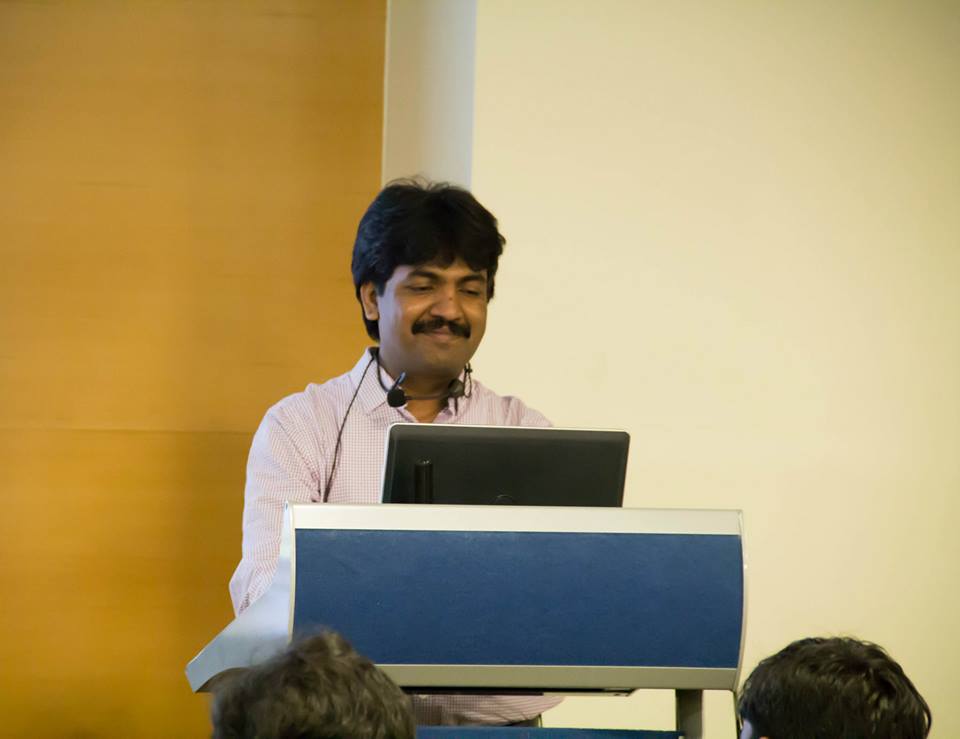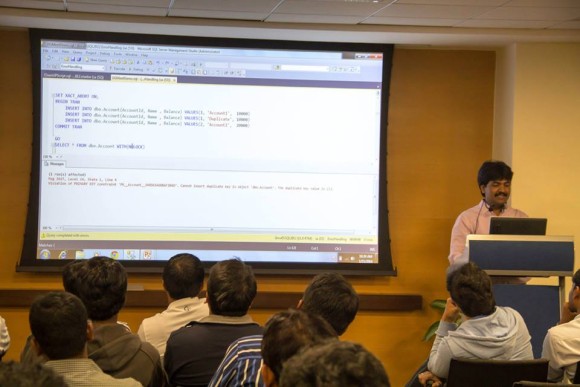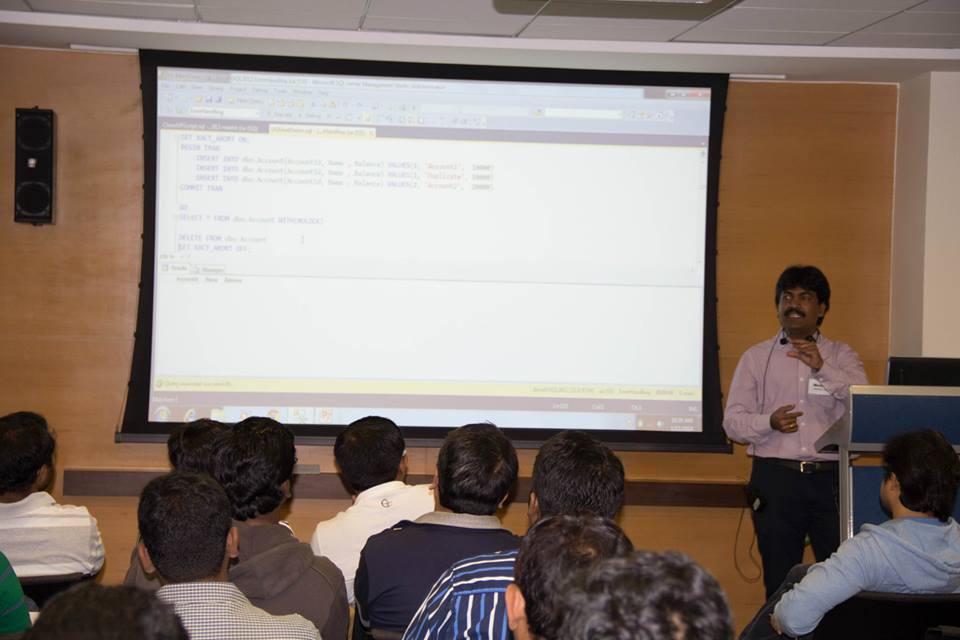 Basavaraj Biradar holds master’s degree in Computer Applications with gold medals from Gulbarga University, India besides Microsoft Certified Professional Certificate in SQL Server. Basavaraj has rich experience of 19+ years in designing and developing database for complex, large and online systems. He is a Machine Learning expert and developed multiple ML Models using Sql-R. Currently, Basavaraj is working as an Architect in a leading IT company.
Basavaraj Biradar holds master’s degree in Computer Applications with gold medals from Gulbarga University, India besides Microsoft Certified Professional Certificate in SQL Server. Basavaraj has rich experience of 19+ years in designing and developing database for complex, large and online systems. He is a Machine Learning expert and developed multiple ML Models using Sql-R. Currently, Basavaraj is working as an Architect in a leading IT company.
He has reviewed multiple books on Sql Server. The recently reviewed book by him is Sql Server 2014 Development Essential book.
Basavaraj speaks on SQL Server topics in Microsoft User Group meetings and inside his company. You may contact Basavaraj through his email id basav [AT] sqlhints [DOT] com.
Below are few photos captured during his one of the Sql Server Bangalore User Group meeting @ Microsoft Bangalore:





Notify me of new posts by email.
good explanation
Hi
thank you for taking some time and putting your knowledge.
good explanation regarding memory computing.
good work..
thanks
sri
Thank you Sri
Hi,
Great article on SQL 2012 Sequence Caching and internals and a good one on the hekaton for SQL 2014.
Both articles are very easily understandable and clear.
Thanks for taking time to write these articles.
Regards,
Madhan P.R.
Thank you Madhan.
Thanks for providing very useful articles.
Every article in this blog contains very valuable information with well explanation.
Salute for your dedication work…
Thanks for providing new functions with examples…
Thanks Sir Ji !
pls notify new posts
To get updates on new posts please subscribe to blog via email. “Subscribe to Blog via Email” option is available on the right navigation bar..
Hi Basavaraj Biradar,
In my most of the sp i used cursors because i need to split the tables according columns values, many said cursor usage is the bad practice, i could not able to replace the cursor with temperary tables so could you guide me?if u want i ll sent my one sp…
Your each example is clear, concise and simple to understand, which lacks in most of the tutor websites where lines of explanation is given for simple thing. Hats off sir ji…
Thank you Prashant
Nice site Basavaraj,your examples are easy to understand
Sir,
Your example is very easy to understand the SQL concept.
Thank you A. Ganesan.
Dear Sir,
can you pls help me on below query which work faster and why
–with where
select * from coustomers
where name = ‘rishi’
group by salary
–with having
select * from coustomers
group by salary
having name = ‘rishi’
rishi saw
Hi Basavaraj,
All the articles are very easily understandable and clear. Thank you so much Sir.
Can you please write some article on Transactions and Isolation Levels with examples.
Thanks,
Krishna Murthy
Thank you Krishna Murthy. Next month will try to post these articles.
Hello Basavaraj,
You have explain every topic in very excellent way. Thank you very much for explain the various concept. 🙂
Please also upload the document on Index and how go improve performance of Query.
Thanks,
Vijay Singh
Thank you Vijay Singh
Sir,
I need your help with a query to get monthly sales total for next 12 months from today’s date
Example,
1 Jan 1500
2 Feb 2500
3 Mar 1000
….
Thanks in advance,
Hello ,
Nice explanations and blog. Keep inspiring people.
Regards,
Vikram
I have 3 databases in one server named A, B,C. One procedure sp_1 is in B. I will call that procedure from either A or C.According to calling database (i.e A or C) I have to set @Calling_Db_name which is in Procedure sp_1.
How I can do this.
Please help me..
Great web site. Thank you Basavaraj!
Hello Basavaraj
I wanted to congratulate you for the excellent examples and easy way to view the result thereof.
congratulations and I hope to see more examples and tips publish.
Best regards
Luis Santos
Thank you Luis Santos
Dear Basavaraja sir
I am really happy and very nice to read your blogs . your blogs will help me for every level of SQL DEVLOPER and Administrator to develop and implement the skills.
thank you once again
sir ,
i want to create the Data model , i have one DB called sales which is in dev , i want to recrete newly requesting your help eaither in any way of scripts or step by step .
thanks
sateesh
Hi Basavaraj,
Very nice articles and good explanation of SQL Server internal mechanisms.
Regards,
Pratap
Thank you Pratap
This is very good
Wow, so very good for me to know what you teach about SQL.
It help me a lots, thanks you.
Simple and easy way to get knowledge on SQL Server… All your articles help me a lot, thank you sir….
Thanks a lot for your articles.
Great job.
I’m looking for a direct solution to the above question and i don’t find any answer at this time. I obtain it with a cursor loop, but not with JSON support in SQL SERVER
I have a table with login and role.
login1 , role1
login1, role2
login1, role3
login2, role2
I try to find a solution to obtain a json
[
{“login”:”login1″,”Role”:[“Role1″,”Role2″,”Role3”]}
{“login”:”login2″,”Role”:[“Role2”]}
]
Hi Sir,
Is there any tools for migration from 2008 R2 ,compact 80 to 2012 compact 100.
Please suggest if any.
This is very good
Hello, it’s possible to covert each single of a table to a single json row.?